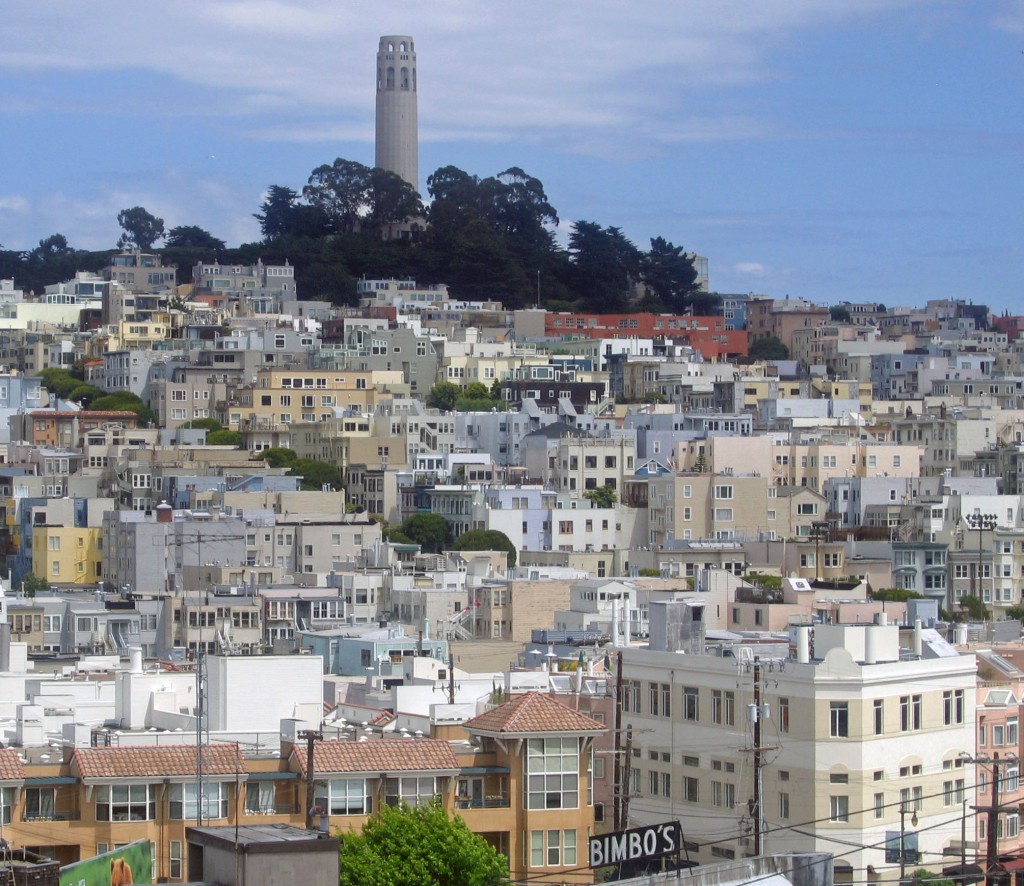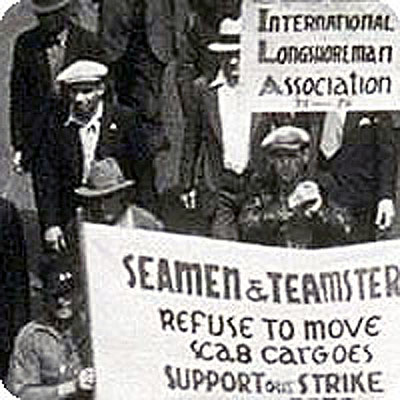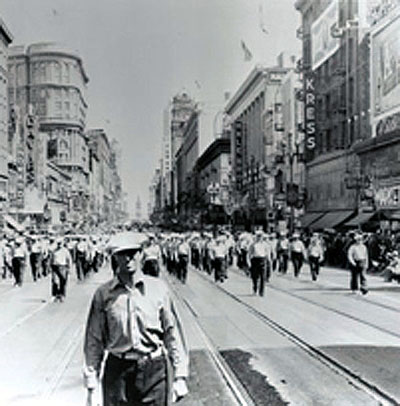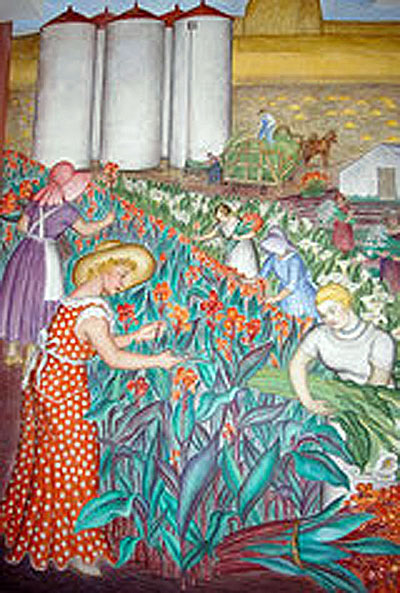Fiction: Excerpt from “Liberated Zone” by Terence Cannon
“The past is not dead. In fact, it is not even past.” *
by Terence Cannon
An excerpt from Chapter 8 of my web-novel LIBERATED ZONE, A Novel about Thinking about 1968, readable online at www.liberatedzone.com.
Jimmy O’Shea has gone to ground in an apartment on Telegraph Hill to avoid arrest while his lawyer arranges the terms of his surrender.
Why don’t we just hike up to Coit Tower, Jimmy? said Jimmy, they don’t look for fugitives there. How do you know if you are a fugitive? Has an arrest warrant been signed? Is there a photo on the wires? How many points are there in an all-points bulletin? Are there one-point and two-point bulletins? What is the number n, above which n-points becomes all-points? And what are points?
Been here 12 hours. Psycho already.
Climbing the street to Coit Tower drained the voltage from him, then at the peak the dull blue shockwave, the all-encompassing Bay. Two tourist couples by the rounded parapet. Who tours San Francisco in January? Sky the color of drywall, freighters aimed at and departing from the Bay Bridge, the Something Maersk and Something Else Maru, headed for Japan, for the Embarcadero.
Alcatraz. Bare ruined. Does the pain growl on the tiers for its lost prisoners? Terrific therapy, Jimmy, hike up here and look at a prison. To the east, the waterfront, political spine of San Francisco, the docks its vertebrae, the ’34 General Strike its creation myth.
Bridges v O’Shea 1934
EXT. CALIFORNIA COUNTRYSIDE. NIGHT. JULY, 1934.
Black and white film.
A locomotive pounds the desert rails, its single headlight cleaves the dark. Drive wheels churning, it passes us in a cloud of steam.
INT. A BOXCAR ON THE TRAIN.
WALTER O’SHEA, 22, not yet Jimmy’s father by a decade, struggles in sleep among bales and crates. The locomotive whistle screams.
EXT. A FERRYBOAT. DAY.
Walter, in rumpled clothes and dented fedora, stands at the deck railing. He looks to the West. San Francisco glistens in the morning sun. Bagdad-by-the-Bay.
C. U. Walter’s face, unshaven, excited, hopeful.
EXT. SAN FRANCISCO TRADE CENTER. DAY.
Walter descends from the ferry to the dock. We follow him through the Ferry Building to the cobblestone street outside. Above and behind him we glimpse the partly completed Bay Bridge.
EXT. SAN FRANCISCO EMBARCADERO. DAY.
Walter shakes his head in disbelief, looks up at the clock on the building, shadowed by morning light. It says 9:10. He looks again at the waterfront. It’s empty. Where are the trucks, the workers, the traffic? Where is the pellmell of the biggest port on the West Coast?
C. U. Walter’s face. He’s confused.
POV: EMBARCADERO
The camera looks up and down the street. It sees figures in the shadows. A POLICEMAN stands in the center of the Embarcadero. A man runs across an intersection two blocks away. There are no cars, buses, trucks. Three policemen on horseback trot down Market Street, turn to Walter’s right, move north.
WALTER walks south on the Embarcadero toward Mission Street. The POLICEMAN approaches him.
POLICEMAN
G’wan in, kid. If it’s a job you’re wanting,
we’ll protect you. Off the ferry are ya? Don’t
be afraid, g’wan. Plenty o’ work. Plenty o’
work.
WALTER continues to Mission Street, uneasy. At Mission and Steuart an old car turns the corner behind him, a man perched on the passenger side running board; the car pulls beside Walter, stops. Three men jump out. They are longshoremen. The one on the running board carries a lead pipe. They surround Walter.
The film has become increasingly grainy, scratches appear. Now and then it goes blank, with splotches of scorched mildew.
MAN
Hey, buddy, we’ll have a word with ya.
WALTER
Sure.
MAN
New in town?
WALTER
Just off the ferry.
MAN 2
Off the ferry he says.
MAN
Who sent you?
WALTER
Nobody.
MAN 2
Nobody sends a lotta
guys to Frisco these days.
MAN
Look, kid, maybe you don’t know what’s goin
on. Maybe you do. I’ll give it to you straight.
General Strike. Town’s shut down. Anybody
works is a scab. You do know what a scab is?
WALTER
A strikebreaker.
MAN
Lowest form of life. A cockroach leaves the
room when a scab comes in cause a scab is an
insult to his dignity.
The soundtrack rasps, words interrupted.
MAN FROM
RUNNINGBOARD
Get to the part where we break his legs.
MAN
Kid has to be educated. Kid looks smart.
Working conditions: get up at dawn trudge
dock to dock straw bosses gotta bribe em get
a job work 24 36 72 hours at a stretch phony
Blue Book union don’t know where next job
coming from cops murdered two workers,
maritime industry shut down whole coast San
Francisco stores unions everyone out on
strike with us rich have fled an left their
vigilante thugs to beat it out of us
Two sides, kid, those who build the world and
those who own it. You wanta learn more,
here.
MAN hands WALTER a copy of the Western Worker.
MAN
Now that you know the situation . . . .
MAN FROM RUNNINGBOARD
See you scabbin we break your legs.
INT. FLOPHOUSE. NIGHT.
Walter sits on a cot, looks through his wallet for a card, finds it. Brand-new press card: St. Louis Post-Dispatch.
INT. STRIKE HEADQUARTERS, INTERNATIONAL LONGSHOREMEN’S ASSOCIATION.
A wooden room, a desk, two chairs. Behind the desk sits HARRY BRIDGES, head of the rank and file strike committee. In front of the desk is WALTER O’SHEA, notepad and pencil in hand.
BRIDGES
Walter O’Shea.
WALTER
Yes.
BRIDGES consults a file card.
BRIDGES
Says here Strike Committee Car 8 stopped
you Tuesday morning at 9:12, interviewed
you. Corner of Mission and Steuart.
WALTER
You certainly are well-organized.
BRIDGES
The bosses are. So must we be. Did our boys
mistreat you in any way? Harm you?
WALTER
They offered to break my legs if I came back.
BRIDGES
To scab.
WALTER
That was the message.
BRIDGES
Did they explain the strike issues, working
conditions, and goals?
WALTER
In lurid detail.
BRIDGES
What can I add?
WALTER
If there is a central issue in the longshore
strike…
BRIDGES
There is no longshore strike, brother. This is
a maritime strike, the entire industry, sixty
unions. The ILA is one union, though an
important one.
WALTER
In the maritime strike.
BRIDGES
Union control of hiring halls. If we can’t
control the hiring halls, our right to organize
is a farce, the unions can and will be destroyed by
discrimination and blacklisting, and the
men who took part in this strike will be driven
out of the industry. We can’t permit a fink
hall.
WALTER
Your own international president, Mr. Joseph
P. Ryan, repudiated you.
BRIDGES
Mr. Ryan came here on his own, spoke for
himself, made a one-man sellout agreement
with the bosses, and left town. We are not
bound by his private actions.
WALTER
But there is an agreement.
BRIDGES
Not with the workers. The forces of the city
and state are arrayed on the side of the
shipowners. They have instituted a reign of
terror under which peaceful pickets are
arrested and beaten without cause. Police
Department thugs have murdered our men
and gone unpunished. Bloody Thursday was
an attack by the shipowners, through
the police, on the strikers.
WALTER
They say the strike is led by communists.
BRIDGES
The only ists it’s led by are unionists.
WALTER
Here in the Western Worker, given to me by
one of your men, it calls for Communist Party
members all along the coast to mobilize in
support of the strike.
BRIDGES
God bless em.
WALTER
And you yourself are not guided by
communists.
BRIDGES
I’m guided by the rank and file and only the
rank and file.
The film runs out in flashes of black specks and scars. It is replaced by 8mm color film in a handheld camera.
INT. THE ANCIENT HOUSE IN ST. LOUIS. 1958. DAY.
WALTER sits on the couch talking to JIMMY, 17, seated in a molded plywood Eames chair.
WALTER
That was my first interview. My first
words in print.
The film turns to 16mm color in a camera on a tripod.
EXT. THE GARDEN OF THE ANCIENT HOUSE. 1963. DAY.
WALTER and JIMMY walk together, out-of-focus gladiolas behind them.
WALTER
I’m concerned about this job you’re taking on
the waterfront. You know the longshore
union is controlled by communists. You have
to be careful about that.
JIMMY
Dad, that was 30 years ago. There are no
communists anymore.
How the future might have been
had the past not arrived
The sign on the Coit Tower doors neither confirmed nor denied the existence of hours open to the public. Jimmy knew there was something inside, dioramas, exhibits. He nudged the door open. A damp cinder smell, the coal-fired basement of the house in St. Louis.
“Anybody here?”
“We’re closed,” catacomb voice.
“When are you open?”
“Not now.”
“What’s in here?”
“Pinko art.”
Aha. San Francisco known for its pinko art. Pinko seal in Sausalito. Pinko conquest of California in Rincon Annex, pinko St. Francis feeding birds somewhere. Jimmy slid through, faced serious maidens in sunbonnets gathering cala lilies by the armload before three silos like giant baby bottles in a field of yellow ochre, tiny horses, wheat like golden barns, farmworkers in polkadot dresses.
“Where are you?”
“Closed.”
He found the voice in an inner room, caretaker of some sort, staring at a pinup calendar.
“Hi, name’s Jimmy. Last day of my vacation, walked all the way up, art’s no good huh?
“Commie shit.
“You like the modern stuff.” Jimmy splashed squiggles in the air. “Abstract Expressionism, Jackson Pollack.”
“That ain’t art.” “You gotta admit, these guys here sure can draw.”
“Oh yeah, they can draw.” He heaved his Mussolini bulk from the chair. “I’ll show you what they draw.” He led Jimmy to a downtown street corner. Firmjawed teamsters loaded wooden boxes of Golden State produce, a blue cop made a call from a street box. “Look at that. What’re they selling at the newstand?” he asked.
Masses, Daily Worker. Top Two on the newstand ratings.
“See what I mean?” he said. “Waste of talent.” A man suspiciously like a self-portrait-of-the-artist glanced up at Jimmy from the display ofleft-wing papers.
“Time,” said Jimmy. “On that rack, they sell Time magazine.”
“Big deal. To make money. Go ahead if you want, look around. It’s not life.”
Jimmy strode through California circa 1934, past the mighty effluvia flowing down Shasta Dam past gold panners, hordes of solemn unemployed, libraries, printing presses, newspapers, typesetters, brakemen, switchmen, magazine readers, Brinks armored guards, back to the Ukrainian blonde haloed in lilies. The smell of age and bad care, as if the masses were stashed in a ripoff nursing home, moldy and underfed, and these were their memories, boneless, rounded flatly, like memory, here today, gone before, remembered only by the artists, rendered, dead.
He started round again more slowly not to disturb the aged. Thirty-four years since ‘34. Murals painted halfway between me and the 19th century. Thirty-four years old then that grapepicker with the pipe in his mouth, sixty-eight now telling his grandchildren what a tough, idyllic, miserable, golden time that was.
In the public library reading room the newspaper readers learned B. BUFANO’S ST. FRANCIS JUST AROUND THE CORNER. THOUSANDS SLAUGHTERED IN AUSTRIA. MORATORIUM IN NORTH DAKOTA. HOME FORECLOSURES, BANKS REFUSE. This must be art, you can read the headlines. World War II is coming but the guy reading the Western Worker doesn’t know it. Don’t get up, comrade, you have time. History has not yet broken out in Spain. A man in green, not a bone in his body (were anatomy classes counter-revolutionary?), pulled from the shelf above his head what else! but Capital. I, Jimmy, recommend the section on the Working Day, good journalism. The bookshelf, containing works by Gorky, Strachey, and Ostranvanyan (who’s Ostranvanyan?) extended around a corner into a real, actual, existing-in-1968 window, which Jimmy touched to make sure, a thin three-paned window set in an alcove in the Coit Tower wall through which real 1968 sunshine leaked. Clever, a true-in-this-world-alcove lined with true-in-that-world painted bookshelves in skewed perspective so the man in green (another self-portrait?) could withdraw Capital at such an angle the viewer could read the author’s name, Karl Marx.
Comrades! Comrades! Did you really see people like this? What is this stolid, likeable, unfunny, endeavored celebration about? Labor, working. That which makes us different from the animals. Cut, sow, fill, load, chop, pick, box, read, print, pan, list, write, speak, stuff, bottle, crate, ship, invest, cook, hammer, beat, haul, dig, build, unload, brew, calculate, protest. I am moved, I love these people, everyone in frightening motion, working, working, concentrated on the task at hand, the motion of the belts, the cogs before them, the contents of today’s news, the skill, the sheer
productivity of it all. The massive dam you built, the water channelled, the power harnessed and transmitted, all in motion. A great earnest metaphor: let’s get the job done!
Except for this longshoreman, sitting on the dock of the bay, pipe in mouth unsmoking, an uncertain item on his lap, who frowns, strains backward to look into the nonexistent-in-his-time window alcove.
Comrades, I’m confused. These amber waves of yellow paint, the fruited mural walls, the brotherhood, this utopia of the present moment; even your unemployed look as if an actuarial mistake temporarily excluded them from the task at hand. Are you painting what you see should already have been had not what is occurring in your time taken place? Or is this what you think the future will be like ages hence, say in 1968?
Why is no one screaming?
What is not here? No one is beating his children, shooting dope, weeping because God betrayed him, molesting choir boys, cheating on his wife. There are no black folks here, (ah, there is one in the crowd of unemployed; the great inmigration from the South will take place during the World War you don’t know is coming). No one’s driving drunk, got the willies, the cold sweats, boils and diarrhea. No one’s dodging the draft. No one’s protesting racial segregation, no one’s thrown from a motel window in a drug deal gone bad. No one’s kicking their kid out of the house for accepting Buddha as his lord and savior king. No one’s being raped. No one can’t stop screaming.
The longshoreman cannot see round the corner of the alcove. There is no alcove in his world; it’s a hole in his universe. We can see because we’re four-dimensional space creatures who understand that what he thinks is the San Francisco waterfront is actually the inside of a tower on a hill above the waterfront he thinks he’s in. We 4-D creatures who have travelled here from 34 years in the future can look in on his behalf, but by the laws of time travel and mural painting we cannot tell him what is there. So why does he strain, why does he suspect something is within?
Timetraveller Jimmy looked.
Inside the recess a man pulled a rope stiff with his neck, eyes purple and dead.
Jimmy leaned into the alcove, hand braced against the glass. The corpse had stepped off a low wall, no, a plaque, and tipped it as he fell, stepped off his own memorial, the rope knotted to the darkness above him. The light that shone on his strangled neck came from the real window in the Tower and was also painted coming from that same window, two sources of light, one on Jimmy’s hand as he touched the rope thinking to cut him down, the other only on the rope and the corpse and on the name chiseled in the memorial plaque off which the man had stepped into a darkness where no light, real or painted, shone:
Bill Montenegro
1920-1968
No no no. No no. No. This is mural time. Black Mountain Bill lives in my time. Jimmy rubbed the plaque. Only dust from 1968 came off on his fingers. The dead face did not look like Bill, workingclass hero, wounded at Pearl Harbor, organized sugar workers in Hawaii, but why should it? Bill’s eyes don’t bulge, his face ain’t purple. Jimmy closed his eyes, flicked them open to catch the mural at its lie. The man who helped Jimmy pour sugar in the gas tanks of tractors being loaded for South Africa on Pier 18 hung there still.
FOUR YEARS EARLIER.
INT. A PIER ON THE SAN FRANCISCO WATERFRONT. 1964. DAY.
C.U. Face of BILL MONTENEGRO, 44, creased, lean. Soft longshore cap, tilted. Camera pulls back. BILL walks past bales of cotton piled high in the shed. He smiles.
POV; what he’s smiling at: Eric Hoffer, the right-wing intellectual’s longshoreman, pipe in mouth, old fraud, holding court in a cubby of cotton bales. At this moment, his only audience is JIMMY O’SHEA, one of those young radicals recruited by Bridges to the waterfront from the civil rights movement. BILL draws close to the pair.
HOFFER
The Negroes aren’t serious about their civil
rights movement, lad.
BILL swings his longshore hook into a bale near HOFFER’s head by way of greeting.
HOFFER
Bill.
BILL
Eric.
HOFFER
If they want the world to take them seriously,
they’ll have to stop praying and whining and
die for their cause.
JIMMY
Your advice to them is die?
HOFFER
Get guns, take over a town in the South
somewhere, and get themselves slaughtered
like the blacks in South Africa. Then we’ll take
them seriously.
JIMMY looks at BILL incredulously.
BILL
They did that already, Eric. They’ve died
aplenty. You should try it. Then I’ll take you
seriously.
He yanks his hook out, winks at JIMMY, walks on.
Jimmy went for Little Mussolini. “Excuse me, sir, there seems to be an anomalous painting out here, I wonder if you could explain.” The lie helped him not to break down. “I’m sure you know them well and this particular painting doesn’t seem to fit into the overall genre.”
“You sure you’re a tourist?”
“Right off the boat.”
The man stuck his head in the alcove. No, he had not seen it before. If it had been there, he would’ve. It was new.
“I hafta admit these guys can paint,” he said, “you can even read the suicide note.”
“Excuse me?”
“Yep. I’m at the end of my rope. I’m sorry for copping out. It’s up to you. Do it better. Say goodbye to the guys for me. And Jimmy O’Shea.”
“Where’s it say that?”
“Here on the note. Say what?”
Jimmy picked at the curled edge of the paper, which lay at the hanged man’s feet. A painted note upon a painted wall.
“You’ve been a peach,” said Jimmy. He exhaled it, pee-ch, instead of ramming the caretaker’s head into the wall, splashing Diego Rivera earthtone blood on the railroad yardmen repairing the tracks to the left of the alcove, and could not bring air back into his lungs until he was outside and the sky rushed away in grayest vacuum.
Say goodbye to the guys for me. And Jimmy O’Shea.
* William Faulkner





